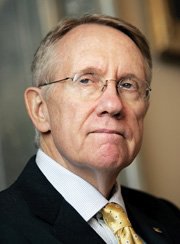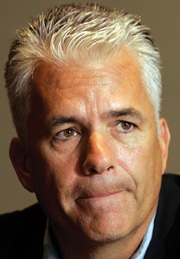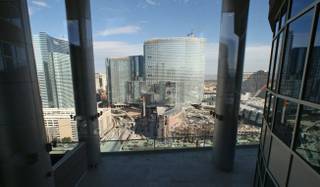Wednesday, March 25, 2009 | 2 a.m.
In Today's Sun
Document
Reader poll
Sun Archives
- Reid, Ensign made calls to banks for MGM (3-23-2009)
- Lawsuit clouds future of CityCenter; MGM responds (3-23-2009)
- MGM Mirage gets debt waiver, swings to quarterly loss (3-17-2009)
- Before recession, success further fed gaming industry's egos (3-16-2009)
Sun Blogs
A small buzz has followed Nevada’s two senators this week after disclosures that they asked major financial institutions, including some receiving federal bailout money, to consider lending money to MGM Mirage so the gaming giant can finish work on its massive CityCenter project.
Did the senators twist arms to deliver for MGM Mirage, the state’s largest employer and a massive campaign contributor? Would the bankers now expect a favor in return, as Congress entertains caps on executive pay and tough new banking regulation?
Ethics watchdogs, however, are greeting those questions with a collective shrug.
So far, they say, the actions of both Democratic Sen. Harry Reid, the majority leader, and Republican Sen. John Ensign, the fourth-ranking leader in his party, appear to be nothing more than senators doing their jobs.
The $8.7 billion CityCenter is the largest private building project in the nation. The casino company needs more than $1 billion to complete it at a time when credit is tight and the economy threatens its future. Gaming revenue is down to 20-year lows, and some think MGM Mirage is on the verge of seeking bankruptcy protection.
Reid and Ensign defended their actions, saying they are trying to save jobs: CityCenter employs 10,000 construction workers on the Strip. Nevada’s unemployment rate is 10.1 percent, with construction especially hard hit by the housing bust.
“Certainly there is an implied pressure when a senator calls and says, ‘Give this project a fair shake,’ ” said Mary Boyle, a spokeswoman for the good government group Common Cause.
But Boyle and other ethics professionals say they see little fire amid the smoke coming from Las Vegas.
“The question we would ask is, ‘Are the banks getting something in return for this, if they do grant this loan?’ Obviously, there is no evidence of that,” Boyle said. “There’s an argument to be made they are working to take care of their district, stimulate growth, save jobs.”
Public Citizen’s Craig Holman, a veteran ethics watchdog who has been trying to reform the nexus between money and politics for decades, said, “When I become suspicious about this kind of activity is when there are efforts to hide.”
The willingness of Reid and Ensign to discuss their lobbying efforts puts their actions “above the board,” Holman said.
He noted that before making calls, Ensign had sought counsel from the Senate Ethics Committee — the first time Holman had heard of a lawmaker doing that. Ensign told the Las Vegas Sun on Monday that the ethics committee told him his actions would be acceptable.
“Good move by Ensign — Reid should have thought of that,” Holman said.
Watchdogs also noted the difficult economic climate, saying that nudging banks to lend is exactly what Washington needs to do to get credit flowing.
“We’ve got to get government sticking its nose into the banking business at this point because they’re not coming through to solve the mess they’ve made,” Holman said.
What remains unknown, however, is how the requests played out on the other end of the phone lines.
Both senators declined to release the names of the financial institutions they called.
Reid has been contacting the financial houses for the past few months. Ensign has been calling since the week before last.
Ensign told the Sun he called several institutions, spoke with CEOs or political affiliates and was careful to emphasize that the project is important for jobs in Nevada.
Ensign said he stressed that he “understood they had to make the right business decisions, but at the same time how important the project was for jobs in Las Vegas.”
Ensign confirmed that several of the companies he called had received taxpayer bailout funding. But he declined to name names, saying he didn’t want to put the lenders in the position of having to publicly explain whether they would help MGM Mirage.
Reid spokesman Jon Summers also declined to identify the companies the senator called or whether bailout recipients were involved. But Summers said Reid never asked directly for a loan for MGM Mirage. “Sen. Reid called the banks and asked them to give this project a fair shake,” Summers said.
MGM Mirage gives campaign money broadly to both Democrats and Republicans in Congress, and is the top contributor to both Reid and Ensign. The company has given $152,750 to Reid over the past five years, and $134,000 to Ensign, according to the Center for Responsive Politics.
The effects of the senators’ actions might become clearer in the future — if MGM Mirage receives loans, or if the banks receive favorable treatment.
“I just don’t see it yet,” Holman said. “Down the road if you saw any special treatment for the banks that gave the loans, that ought to raise suspicions.”
Boyle said any effort by the senators to go easy on the banks or provide them with favors in this economic climate would stand out. “Financial institutions are pretty much the scourge of the earth right now.”




Join the Discussion:
Check this out for a full explanation of our conversion to the LiveFyre commenting system and instructions on how to sign up for an account.
Full comments policy